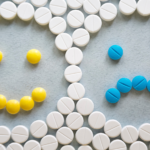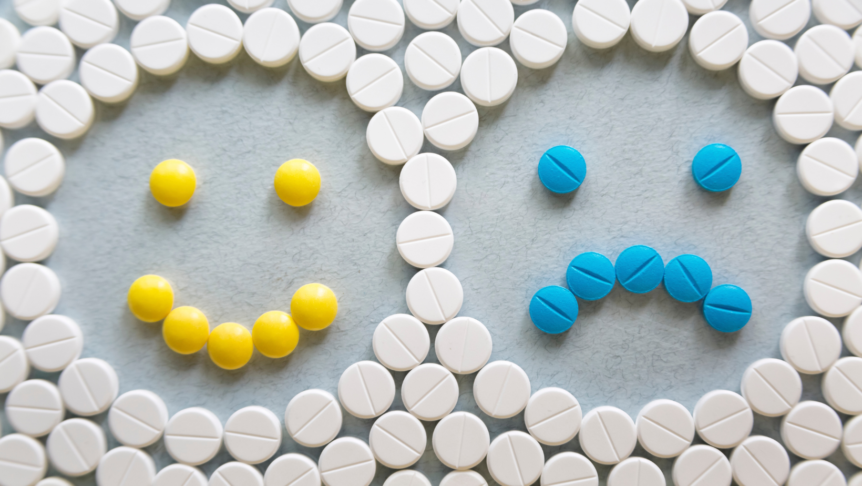Breaking news: Little evidence that chemical imbalance in the brain causes depression, UCL scientists find. Read on to learn what to do about this new information.

Researchers have found that there’s no evidence that a chemical imbalance in the brain causes depression, as was once believed.
“Many people take antidepressants because they have been led to believe their depression has a biochemical cause, but this new research suggests this belief is not grounded in evidence,” (- Joanna Moncrieff, a professor of psychiatry at University College London in The Guardian).
An astounding 1-in-6 adults are prescribed antidepressants in the UK. The massive problem is similar around the globe.
Warning: Don’t stop taking any medication without the support and guidance of a physician.
Depression isn’t what you think it is
The fact is that doctors don’t know what the cause of depression is.—and they have created the concept of depression in the first place. Here’s how they define it…
“Depression (major depressive disorder) is a common and serious medical illness that negatively affects how you feel, the way you think and how you act. Depression causes feelings of sadness and/or a loss of interest in activities you once enjoyed. It can lead to a variety of emotional and physical problems and can decrease your ability to function at work and at home. Symptoms must last at least two weeks and must represent a change in your previous level of functioning for a diagnosis of depression.” – Psychiatry.org”
Their unproven idea was that some thing called depression “causes” feelings of sadness and affects how you think. They don’t want to deny your experience, and rightly so, but all they have done is given it a label, not a cause.
The term depression is really a word for a collection of symptoms—rather than a cause of them.
So the question in everyone’s mind is, once again, what’s the cause?
This question being raised anew is a very good thing, because the antidepressant treatments were really not working, though for some they appeared to be.
So what’s really going on, and…
If I take anti-depressants should I stop?
Absolutely not without consulting a doctor.
If they seem to be helping in your case, they may somehow be helping in some way. Simply because we don’t know why or how something helps doesn’t mean its not helping.
You should never stop without some other treatment plan or without some healing.
(As well, while it may not be helping with emotional pain, it is causing some effect, so if you do want to stop you must do it carefully, following a plan. It is very dangerous to just stop taking medications.)
You may not know how an engine works, but you know that when you turn the key, the car starts. Good enough.
We need to explore and experiment with our own body to find out.
What I’ve learned from working with people
From my experience, there is a known cause, and a vicious cycle that can and must be interrupted and reversed.
I’ve worked with people 11 years, helping them to stop suffering and access inner peace and joy.
During this time I’ve worked with hundreds of people, and I’ve watched some of the most seriously depressed (and even suicidal) people switch out of bad states, and very quickly.
If they had some biological illness that caused it, that shouldn’t be possible.
As well, long before this new study, both antidepression prescription rates and depression rates have continued to rise, so clearly in the big pciture these drugs are not working.
“Thousands of people suffer from side-effects of antidepressants, including the severe withdrawal effects that can occur when people try to stop them, yet prescription rates continue to rise. We believe this situation has been driven partly by the false belief that depression is due to a chemical imbalance. It is high time to inform the public that this belief is not grounded in science.” – Joanna Moncrieff, professor of psychiatry at University College, London, in The Guardian.
What’s really going on with depression?
Humanity has not understood how the mind works, and so we’ve been mismanaging it. However the mind is working perfectly well as it should, even in depression.
My father suffered severely for years, and he died of suicide. I had my own bout of depression and suicidal ideation which turned around in 2009.
Since my own inner battle and from all my years of successful work with people, here are some basics on what I discovered about the mind and our mental-emotional experience:
- We feel (experience) thoughts.
- A good thought feels good, a bad thought feels bad. This is how we can tell them apart.
- We can only have one thought at a time, but thoughts are very fast, and most people don’t notice there is a gap between two thoughts.
- We are making the mind run from thought to thought, but most people don’t know they are, nor how.
- The mind and thoughts are a reflex system, it is simply a machine, moving from thought to thought by meaningless matching and without any intellegence. (For example, you see a red flower in a garden, and the next thing you have a thought of a stop sign in the mind, then a memory of a car accident, and then you are experiencing fear looking at a flower.)
- Running the mind from bad thought to bad thought, makes us feel worse and worse, yet we we aren’t aware we are doing that (nor how).
- This is true for whatever the content of mind: sad, angry, anxious etc.
- The longer and more intensively we do this, the worse we feel.
- We are not aware we are doing this, nor how. So we are lost, confused and frustrated, making it all worse.
- Doing this, we build up a worsening state, until we leave no time or space available for positive or good thoughts to be experienced.
- The suffering state is very limited; it is a stupid state with thoughts that lacks options, creativity and intelligence.
- The more painful, the more limited we become, the more limited we become, the more painful it is.
- This is a vicious cycle which can be interrupted and reversed.
I’ve seen very intelligent people get into very unintelligent states, where they say bad and even terrible things that are the polar opposite of what they just said days or even moments ago!
It’s like they are a completely different person! One might believe they have Dissociative Identity Disorder (formerly Split or Multiple Personality Disorder).
Does depression control your actions?
Contrary to what psychiatrists think, depression (or feeling bad for a long time), does not affect or control your actions, or the world would be in a much worse state if everyone acted on how the feel. The vast numbers of people suffering mentally with suicidal ideation would have already died by suicide.
Depression is more a verb than a noun or thing. It’s something being done that affects the body and brain. And there seems to be a “tipping point” for both misery and happiness, and we can—and do—push back and forth beyond these points.
What can be done about depression now?
There are many things we can do, and I’ll be writing more about them, but for now, know this…
No matter how we feel, we still hold the upper hand. We are still free and apart from mind, and still have enough intelligence to turn the ignorance of suffering, and the suffering of ignorance around.
This is because we still have the truth, mental-emotional suffering only arises in and as the mind, and we still have that which is not the painful mind.
We must come to understand how the mind works, and what we are doing to drive it and our pain, so that we can stop doing it.
For a vast number of people at least, body chemistry or organ function is not the problem.
Mind is not the enemy, and thoughts are not the problem; unconsciously dreaming the mind, driving it as the unconscious or drunk driver is the problem.
The solution is to understand the mind, how it functions, what the gas pedals and brakes are, how the complex steering works—and to use that understanding to work with the mind, not against it.
Cindy
PS–Take the next free Driver’s Seat of the Mind Challenge to make some insightful eye-opening discoveries about the mind and how it works, and become Conscious For Good. <—Click there! Or read more about it here.
—
Cindy Teevens
Spiritual Facilitator, who keeps it real

